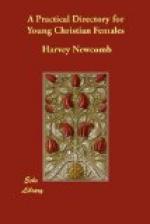truths of Christianity, besides its essential doctrines.
But some of these are of more consequence than others.
If a post or a beam is taken away, the
building is greatly marred and in danger of falling;
yet, if well covered, it may still be a comfortable
dwelling. Again, although a brace or a
pin is of service to strengthen the building,
yet either may be taken away without very serious
injury. But a frame may be complete
in all its parts, and yet be no building. Without
a covering, it will not answer a single design
of a house; and just in proportion as it is well covered,
will it be a comfortable residence. Just so with
Christianity. The covering of the house is the
work of the Holy Spirit in the heart, producing gracious
affections, which manifest themselves in a holy life.
But the covering of a house cannot exist without some
kind of frame-work. So experimental and practical
piety cannot exist without a belief of the principal
doctrines of the gospel. The Holy Spirit operates
upon the heart through the truth. He gives
it a personal application; brings it home to the heart
and conscience, and makes it effectual in changing
the heart and life. “Sanctify them through
thy truth: thy word is truth.”
“Of his own will begat he us, with the word
of truth.” “Seeing ye have purified
your souls, in obeying the truth through the Spirit.”
“Being born again by the word of God.”
Thus, the agency of the Spirit is always acknowledged
in connection with the truth. Any religious feeling
or experience, therefore, which is not produced by
the truth made effectual by the Holy Spirit, is not
genuine. There is a kind of indefinite religious
feeling, which many mistake for Christian experience.
They feel, and perhaps deeply; but they know
not why they feel. Such religious feeling
is to be suspected as spurious. It may be the
delusion of the devil. By persuading people to
rest upon this spurious religious feeling, he accomplishes
his purpose as well as if he had kept them in carnal
security. And the clearer our views of truth,
the more spiritual and holy will be our religious affections.
Thus, godly sorrow arises from a sight of our own
depravity, with a sense of the exceeding sinfulness
of sin, as committed against a holy God, and against
great light and mercy. Faith is produced by a
spiritual view of the atonement of Christ, and of
his infinite fulness as a complete and perfect Saviour.
Love is excited by a discovery of the excellence of
God’s moral perfections. Holy fear and reverence
arise from a sight of the majesty and glory of his
natural attributes, and a sense of his presence.
Joy may come from a sense of the infinite rectitude
of his moral government; from the sight of the glory
of God, in his works of providence and grace; or from
a general view of the beauty and excellence of divine
truth. Comfort may be derived from evidence of




